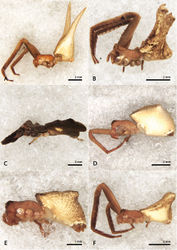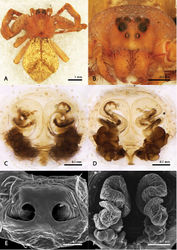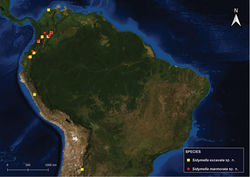Sidymella marmorata
| Notice: | This page is derived from the original publication listed below, whose author(s) should always be credited. Further contributors may edit and improve the content of this page and, consequently, need to be credited as well (see page history). Any assessment of factual correctness requires a careful review of the original article as well as of subsequent contributions.
If you are uncertain whether your planned contribution is correct or not, we suggest that you use the associated discussion page instead of editing the page directly. This page should be cited as follows (rationale):
Citation formats to copy and paste
BibTeX: @article{Machado2019ZoosystematicsandEvolution95, RIS/ Endnote: TY - JOUR Wikipedia/ Citizendium: <ref name="Machado2019Zoosystematics and Evolution95">{{Citation See also the citation download page at the journal. |
Ordo: Araneae
Familia: Thomisidae
Genus: Sidymella
Name
Sidymella marmorata Machado & Guzati sp. nov. – Wikispecies link – ZooBank link – Pensoft Profile
Type material
Holotype ♀, ECUADOR: Quito (Road to Santo Domingo), 0°19'3.83"S, °59'19.95"W, L. Pena leg. (MCZ 133399). Paratypes. ECUADOR: 1 ♀, Quito (Road to Santo Domingo), 0°19'3.83"S, °59'19.95"W, 24.ii.1965, L. Pena leg. (MCTP 42654); COLOMBIA: 1 ♀, Cundinamarca (Chía, Alto de Yerbabuena), 4°51'53.13"N, 74°3'3.30"W, 09.x.2005, K. Lara & X. Marquínez leg. (ICN 7578)
Other material examined
COLOMBIA: 1♀, Cundinamarca, Zipacón, 04°45'44"N, 74°22'46"W, 01.i.2011, D. Luna & C. Romero leg. (ICN-Ar 6379); 1♀, 1j, Boyacá, 05°41'14"N, 73°26'9"W, 01.viii.2003 (MPUJ_ENT); 1♀, Nariño (La Planada), 01°11'16"N, 78°3'19"W, 29.ii.1991, C. Valderrama leg. (LPN 226); 1♀, Valle del Cauca (Chicoral), 03°39'24"N, 76°41'18"W, iii.2005, J. Cabra leg. (MUSENUV 28231); 1♀, Quindío (Buenavista), 04°21'59"N, 75°44'37"W, 13.ii.2010 (CIUQ 9663); 1♀, Cundinamarca (Universidade Javeriana), 04°37'44"N, 74°03'51"W, 03.xi.1995 (IAvH 1157); 1♀, Quindío (Bengala), 04°40'0"N, 75°39'0"W, 05.v.2003, A. Ardila leg. (MAUQ 1691); 3♀, 2j, Cundinamarca (Alto de Yerbabuena), 04°51'55"N, 74°01'27"W, ix.2005, K. Lara & X. Marquínez leg. (ex. ICN-Ar 7578); 1♀, Cundinamarca (Suesca), 05°06'12"N, 73°47'56"W, 06.x.2013 (ICN-Ar 7637); 1♀, Caldas (Samaná), 05°36'0"N, 75°2'0"W, 23.xi.1995, V. Rueda & H. Piñeros leg. (IAvH 180518); 1♀, Boyacá, (Villa de Leyva), 05°40'21"N, 73°27'42"W, 09.vi.2001, L. Benavides & J. Pinzón leg. (ICN-Ar 1249).
Etymology
The epithet means marbled or overlaid with marble and refers to the reticulated colour pattern of the opisthosoma.
Diagnosis
Females of S.marmorata sp. nov. resemble those of S.excavata sp. nov. by the large body size and the general shape of opisthosoma with an anterior concavity and short posterior projections (Figs 2E, 14A). However, females of S.marmorata sp. nov. bear numerous spiniform macrosetae on the mesial surface of femora I and II and five, instead of four, pairs of ventral macrosetae on tibiae I and II (Fig. 14A).
Description
Female: Prosoma and legs I and II entirely orange while the posterior legs (III and IV) are yellowish. Opisthosoma predominantly yellow but with brownish irregular stains distributed randomly, giving a “marbled” aspect to the spider’s dorsum (Fig. 14A); opisthosoma projections short and stout and anal region projected backwards (Figs 2E, 14A). Epigynal plate elevated, with a wide septum and lateral folds concentrically developed towards to the copulatory openings (Fig. 14C, E) copulatory ducts long, hyaline and coiled, leading to a pair of walnut-shaped spermathecae subdivided in chambers and with a tubular glandular-head (Fig. 14D, F). Measurements: eyes diameters and eyes interdistances: AME 0.07, ALE 0.11, PME 0.07, PLE 0.07, AME–AME 0.17, AME–ALE 0.13, PME–PME 0.19, PME–PLE 0.19, MOQ length 0.37, MOQ width 0.17; leg formula: 1–2–4–3: leg I – femur 3.20/ patella 1.20/ tibiae 2.85/ metatarsus 1.80/ tarsus 0.88/ total 9.93; II – 2.40/ 1.03/ 2.12/ 1.60/ 0.77/ 7.92; III – 1.40/ 0.76/ 0.92/ 0.84/ 0.44/ 4.36; IV – 1.72/ 0.76/ 1.08/ 0.92/ 0.52/ 5.00. Total body length 5.44; prosoma 2.36 length, 2.32 wide; opisthosoma length 3.08; clypeus 0.33 height; sternum 1.03 length, 1.07 width; endites 0.58 length, 0.23 width; labium 0.33 length, 0.41 width.
Male: Unknown.
Distribution
ECUADOR: Quito. COLOMBIA: Cundinamarca, Boyacá, Nariño, Valle del Cauca, and Quindío (Fig. 15).
Additional taxonomic changes Sidymellanigripes Mello-Leitão, 1947: 276 (♂). Lise 1973[1]: 16, figs 34‒38 (♀).
Note. The holotype female was collected in Curitiba by Padre Moure in April 1942 and deposited in the Instituto de Proteção do Patrimônio Natural da Secretaria da Agricultura do Estado do Paraná under the number 2497. However, this institution has closed and its arthropod collection was transferred to unknown institutions. The repository of this species is unknown, even after we searched for it in all major Brazilian institutions with arachnological collections, and we assume that the holotype of S.nigripes is lost. Therefore, we propose that the species should be considered a species inquirenda.
Sidymellaobscura Mello-Leitão, 1929: 65. Holotype juvenile collected in Serro da Caraça, Minas Gerais, Brazil (MNHN 8263, examined). Nomen dubium.
Sidymellaparallela Mello-Leitão, 1929: 64. Holotype juvenile collected in Salobro, Bahia, Brazil (MNHN 31114, examined). Nomen dubium.
Sidymellaspinifera Mello-Leitão, 1929: 66. Lise 1973[1]: 21, figs 47–53. Syntypes, 1 immature ♂ and 1 immature ♀ collected in Serro da Caraça, Minas Gerais, Brazil (MNHN 8202, examined).
Note. In the original work, Mello-Leitão (1929)[2] mentioned both specimens as “type”, but they are labelled as syntypes. Both specimens are juveniles that cannot be diagnostic of any species. Nomen dubium.
Original Description
- Machado, M; Guzati, C; Viecelli, R; Molina-Gómez, D; Augusto Teixeira, R; 2019: A taxonomic review of the crab spider genus Sidymella (Araneae, Thomisidae) in the Neotropics Zoosystematics and Evolution, 95(2): 319-344. doi
Images
|


